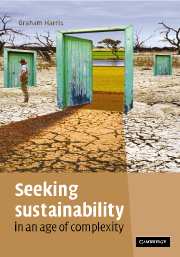Book contents
- Frontmatter
- Contents
- Acknowledgements
- 1 Preamble: the world we are in
- 2 Complexity and complex systems
- 3 New science, new tools, new challenges
- 4 The complexity of ecology
- 5 The generation of complexity
- 6 Micro-interactions and macro-constraints
- 7 A sense of place
- 8 Created landscapes and our changing sense of place
- 9 Catchment form and function
- 10 Catchment loads: ecosystem impacts
- 11 Change detection, monitoring and prediction
- 12 Evidence, uncertainty and risk
- 13 Modified landscapes: biodiversity
- 14 Function in fragmented landscapes
- 15 Environmental flows
- 16 Evidence for global change
- 17 Values and beliefs
- 18 Managing environmental, social and economic systems
- 19 Linking multiple capitals in a changing world
- 20 Community, capacity, collaboration and innovation
- 21 A new environmental paradigm
- 22 Emergent problems and emerging solutions: developing an ‘ecolophysics’?
- 23 Avoiding collapse
- Index
5 - The generation of complexity
Published online by Cambridge University Press: 21 March 2011
- Frontmatter
- Contents
- Acknowledgements
- 1 Preamble: the world we are in
- 2 Complexity and complex systems
- 3 New science, new tools, new challenges
- 4 The complexity of ecology
- 5 The generation of complexity
- 6 Micro-interactions and macro-constraints
- 7 A sense of place
- 8 Created landscapes and our changing sense of place
- 9 Catchment form and function
- 10 Catchment loads: ecosystem impacts
- 11 Change detection, monitoring and prediction
- 12 Evidence, uncertainty and risk
- 13 Modified landscapes: biodiversity
- 14 Function in fragmented landscapes
- 15 Environmental flows
- 16 Evidence for global change
- 17 Values and beliefs
- 18 Managing environmental, social and economic systems
- 19 Linking multiple capitals in a changing world
- 20 Community, capacity, collaboration and innovation
- 21 A new environmental paradigm
- 22 Emergent problems and emerging solutions: developing an ‘ecolophysics’?
- 23 Avoiding collapse
- Index
Summary
The evidence for self-generated complexity in the natural world.
Complexity is one of those ideas where there has been considerable cross fertilisation between fields and disciplines. It is very much a ‘child of its time’ in terms of broader social and intellectual developments and is also another of those ideas that has migrated from science into management-speak and popular culture. What do we mean by complexity, and what is the difference between the complex and the merely complicated? Complicated means what common sense dictates: lots of interacting components or parts. The way in which complicated systems work can be understood by taking them apart and studying the functions of the parts, essentially a mechanistic view. Complexity, on the other hand, reveals that apparently simple sets of interacting agents (sometimes real-life systems, sometimes modelled by equations, algorithms or experimental designs) can produce extremely complex patterns of behaviour – even chaos – and that there are frequently counterintuitive or surprising properties of the whole that are not found other than through the interactions of the parts. If you take a complex system apart it loses its system-level properties. We have good physical theories of complicated systems, but we lack good theories of causality in complex, hierarchical systems; the kinds of systems that dominate the natural biological and human world. So we are confronted, once again, by the problem of understanding systems which show aggregate complexity.
The properties of complex systems evolve continuously over time. This is a world of trajectories not states.
- Type
- Chapter
- Information
- Seeking Sustainability in an Age of Complexity , pp. 53 - 68Publisher: Cambridge University PressPrint publication year: 2007



